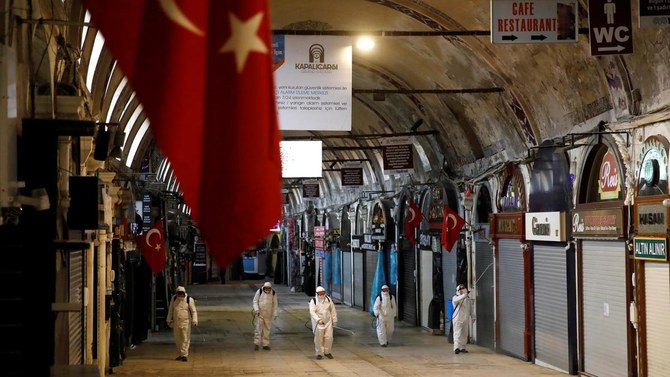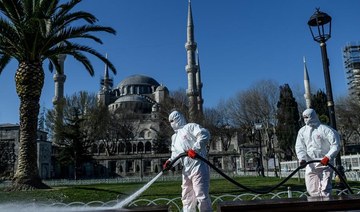ANKARA: Turkey’s economic outlook has been revised downwards by the international rating agency Moody’s amid warnings that the country faces a major shock from the coronavirus pandemic.
“We expect Turkey’s economy to be hit hardest” among G20 economies, Moody’s said.
The agency said that the Turkish tourism sector, which accounts for about 13 percent of the country’s $753 billion economy, will be badly hit by domestic travel restrictions and falling demand because of the outbreak.
In its “Global Macro Outlook” report for 2020-21, Moody’s said: “We expect Turkey’s (B1 negative) economy to be hit hardest, with a cumulative contraction in second- and third-quarter gross domestic product (GDP) of about 7 percent. The shock will likely take a large toll on Turkey’s tourism-related sectors through the summer.”
In its previous report for 2019, Moody’s kept Turkey’s credit rating at B1 with a negative outlook.
Turkey’s tourist industry employs about 1 million people, and experts warn that the coronavirus pandemic will weigh heavily on the sector with restrictions on commercial flights and holiday cancelations.
“The sector will shrink by up to 80 percent because of the coronavirus outbreak,” Bulut Bagci, president of the World Tourism Forum Institute, told Arab News. “I don’t expect any foreign tourists from the European market to come to Turkey this year.”
While Moody’s painted a gloomy picture concerning Turkey’s economic outlook, Treasury and Finance Minister Berat Albayrak said that he remains optimistic the country will meet its 5 percent growth target.
Turkey last week announced a $15 billion fiscal stimulus plan focused entirely on the business sector in the wake of the coronavirus outbreak.
Moody’s revised its 2020 growth forecasts downward for all G20 economies, except Saudi Arabia (A1 stable), which is expected to maintain its GDP growth this year.
With Turkey’s indebted economy vulnerable to external shocks, tourism is one of the main sources of money flow.
Meanwhile, the Turkish business group TUSIAD has penned an open letter to Turkish President Recep Tayyip Erdogan, urging him to take tougher steps against the coronavirus outbreak.
TUSIAD claims that the stimulus plan announced by Erdogan is insufficient to halt the economic fallout from the virus.
Businesses say the country’s lockdown will curb the spread of the virus, but fears remain about the impact on the economy, which has yet to recover from the 2018 currency crisis.
Turkey’s economic confidence index fell by 5.9 percent month-on-month in March to 91.8 points, the state-run Turkish Statistical Institute said on Friday.
The consultancy firm Capital Economics also cut its 2020 growth forecast for Turkey this week, saying its economy would contract by 2 percent and warning that Turkey will face an economic slowdown like other European emerging market countries.
Wolfango Piccoli, co-president of Teneo Intelligence in London, said that Turkey needed an “economic pact” that caters for workers and households in order to minimize economic disruption because of coronavirus.
“The package announced by Erdogan looks like a package for a standard economic crisis, but the current situation is unprecedented and requires unprecedented responses, similar to measures being announced in the UK and Germany,” he told Arab News.
According to Piccoli, Turkish authorities seem to think the crisis is a temporary issue.
“They underestimate the damage that will result, and they are not giving the business community guidance on the duration of the restrictive measures or the length of the economic slowdown,” he said.
Turkey is facing the crisis with limited fiscal and monetary capabilities to help its economy recover, Piccoli said.
















